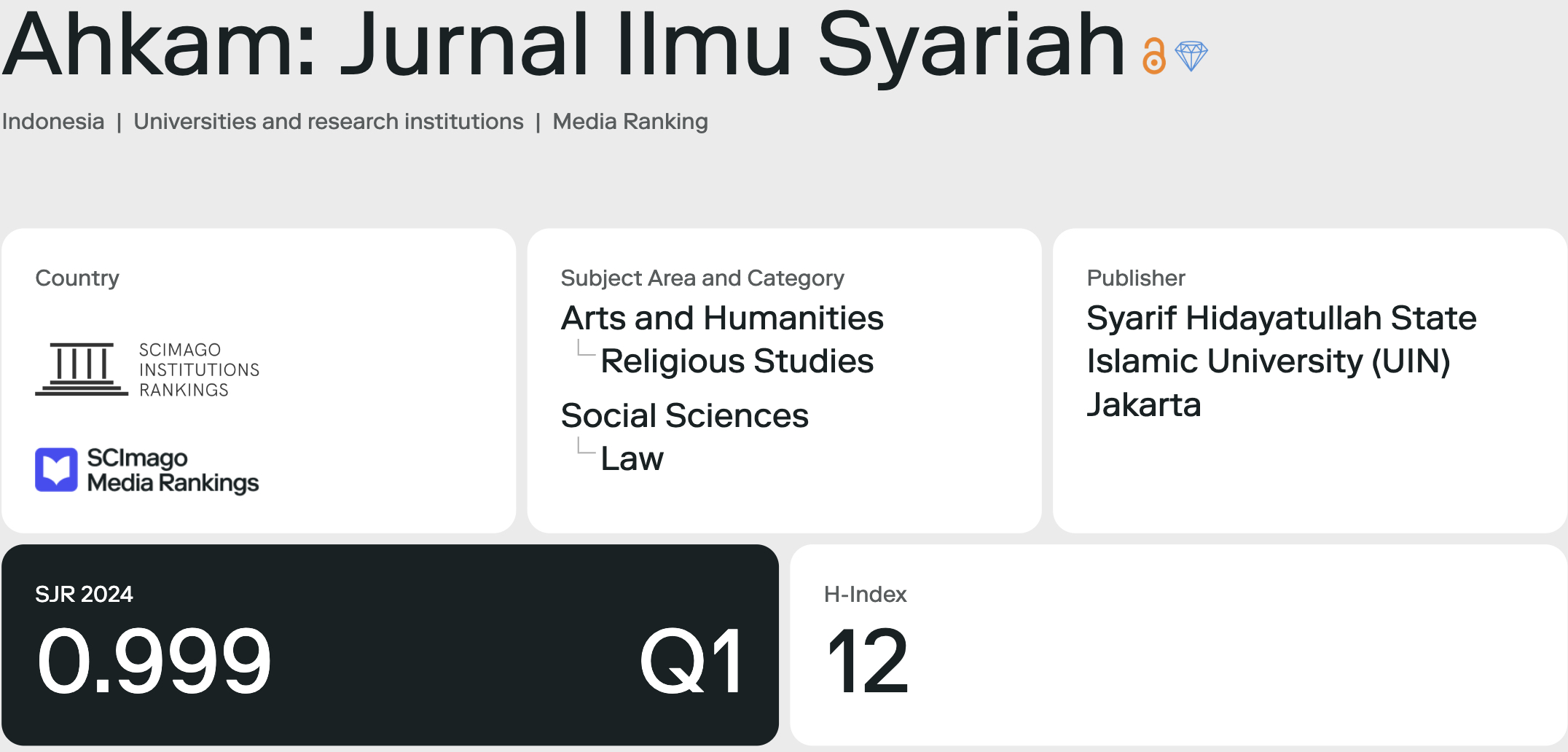The Protection of Women and Children Post-Divorce in Sharia Courts in Aceh: A Sociological Perspective
DOI:
https://doi.org/10.15408/ajis.v22i2.28747Keywords:
protection of women and children, divorce, legal sociology, sharia courtAbstract
This study discusses the protection of women and children after divorce at the Syar'iyah Court in Aceh. A legal sociology approach is used to draw the decisions of the Banda Aceh, Aceh Besar, Pidie, Bireuen, and Lhokseumawe Syar'iyyah Courts. The interviews were conducted with judges, community leaders, village heads, heads of the Office of Religious Affairs (KUA), academics, traditional figures, and non-governmental organizations (NGO) activists. This study concludes that the Syar'iyah Court in Aceh, in its decision, has ensured the rights of women and children. The Syar'iyah Court in Aceh determined the provision of 'iddah, muṭ'ah maintenance, joint assets, and childcare rights to women. Children get living expenses, guardianship from the family, and care from the mother. Sociologically, the law has functioned as a means of social control through the Syar'iyah Court and judges as the main part of the legal structure supported by other elements of society so that the protection of women and children can be realized fairly.
Keywords: protection of women and children; divorce; legal sociology; sharia court
Abstrak
Kajian ini membahas perlindungan perempuan dan anak setelah perceraian pada Mahkamah Syar’iyah di Aceh. Dengan pendekatan sosiologi hukum, studi ini bersumber pada putusan-putusan Mahkamah Syar’iyyah Banda Aceh, Aceh Besar, Pidie, Bireuen, and Lhokseumawe dan wawancara kepada hakim, tokoh masyarakat, kepala desa, kepala Kantor Urusan Agama (KUA), akademisi, tokoh adat dan aktivis Lembaga Swadaya Masyarakat (LSM). Kajian ini menyimpulkan bahwa Mahkamah Syar’iyah di Aceh dalam putusannya telah memastikan hak-hak perempuan dan anak. Mahkamah Syar’iyah di Aceh menetapkan pemberian nafkah ‘iddah, nafkah muṭ‘ah, harta bersama dan hak pengasuhan anak kepada perempuan; dan anak mendapatkan biaya hidup, perwalian dari keluarga dan pengasuhan dari ibu. Secara sosiologis, hukum telah berfungsi sebagai alat kontrol sosial melalui Mahkamah Syar’iyah dan hakim sebagai bagian utama dari struktur hukum yang didukung oleh elemen masyarakat lainnya sehingga perlindungan terhadap perempuan dan anak dapat terwujud secara adil.
Kata Kunci: perlindungan perempuan dan anak; perceraian; sosiologi hukum; Mahkamah Syar’iyah
References
Al-Sābūnī, M. ’Alī. (1979). al-Mawārith fi al-Sharī’ah al-Islāmiyyah. ’Alīm al- Kutub.
Ali, A & Heryani, W. (2012). Sosiologi Hukum, Jakarta: Kencana.
Ash-Shiddieqy, T. M. H. (2010). Fiqh Mawarits: Hukum Pembagian Warisan Menurut Syariat Islam. Pustaka Rizki Putra.
Bedner, A., & Van Huis, S. (2010). Plurality of Marriage law and Marriage Registration for Muslims in Indonesia: a Plea for Pragmatism. Utrecht Law Review, 6(2), 175–191. http://www.utrechtlawreview.org.
Cammack, M., Young, L. A., & Heaton, T. B. (1997). An Empirical Assessment of Divorce Law in Indonesia. Studia Islamika, 4(4). https://doi.org/https:// doi.org/10.15408/sdi.v4i4.766.
Daud, M. K., & Akbar, R. (2020). Hareuta Peunulang: Protection of Women in Aceh according to Customary and Islamic law. Samarah: Jurnal Hukum Keluarga dan Hukum Islam, 4(1), 259–281. https://doi.org/http://dx.doi. org/10.22373/sjhk.v4i1.5921
Decision of Lhokseumawe Sharia Court, 215/Pdt.G/2015/MS.Lsm. (n.d.).
Decision of Sigli Sharia Court, 071/Pdt.G/2014/MS.Sgi. (n.d.).
Decision of the Bireuen Sharia Court, 0252/Pdt.G/2013/MS.Bir. (n.d.).
Decision of the Sharia Court of Meulaboh, 0034/Pdt.G/2013/MS.MBO. (n.d.).
Decision of the Sharia Court of Sabang, 048/Pdt.P/2014/MS-Sab. (n.d.).
Devy, S., & Suci, M., (2020). The Implementation of Verdict Execution on Providing Māḍiyah Maintenance Following Divorce According to Islamic law (Case Study in Syar’iyyah Court Banda Aceh), Samarah: Jurnal Hukum Keluarga dan Hukum Islam, 4 (2). DOI: http://dx.doi.org/10.22373/sjhk.v4i2.6179.
Djawas, M., Nadhiran, H., Samad, S. A. A., Mubarrak, Z., & Azizi, M. A. (2022). Creating Family Resilience in Indonesia: A Study of “Marriage Guidance” Program in Aceh and South Sumatera. AL-IHKAM: Jurnal Hukum & Pranata Sosial, 17(1), 299–324. https://doi.org/org/10.19105/ al-lhkam.v17i1.6150.
Djawas, M., Ridhwan, R., Devy, S., & Husna, A. (2021). The Government's Role in Decreasing Divorce Rates in Indonesia: The Case of Aceh and South Sulawesi. Ahkam: Jurnal Ilmu Syariah, 21(1). https://doi.org/10.15408/ ajis.v21i1.20870.
Fatonah, Y. S. U. dan S. (2015). Evaluasi Strategi Komunikasi Konselor BP4 dalam Mencegah Perceraian. CHANNEL: Jurnal Komunikasi, 3(2). https:// doi.org/http://dx.doi.org/10.12928/channel.v3i2.3276.
Fuady, M. (2018). Metode Riset Hukum: Pendekatan Teori dan Konsep. Rajawali Pers.
Hafsah, (2021). Legal Protection to Children against Domestic Violence in the Urban Community Indonesia during Covid-19 Pandemic,” International Journal of Criminal Justice Science, 16 (2). DOI: 10.5281/zenodo.4756065.
Hammad, M. (2014). Hak-Hak Perempuan Pasca Perceraian: Nafkah Iddah Talak dalam Keluarga Muslim Indonesia, Malaysia dan Yordania, Al-Ahwal: Jurnal Hukum Keluarga Islam, 7 (1).
Hanafi, A., & Yuhermansyah, E. (2020). Urgency of Registration for Women and Child Protection in Gayo Lues District, Samarah: Jurnal Hukum Keluarga dan Hukum Islam 4, (2). DOI: http://dx.doi.org/10.22373/sjhk.v4i2.7942.
Harisudin, M. N. & Hariri, M. (2021). “On the Legal Sanction Againts Marriage Registration Violation in Southeast Asia Countries: A Jasser Auda’s Maqashid Al-Shariah Perspective,” Samarah: Jurnal Hukum Keluarga dan Hukum Islam 5, (1). DOI: http://dx.doi.org/10.22373/sjhk.v5i1.9159.
Hasballah, K., Nurdin, R., Zainuddin, M., & Fahmi, M. (2021). Patah Titi and Substitute Heirs: A Study of Legal Pluralism on the Inheritance System in Aceh Community. Ahkam: Jurnal Ilmu Syariah, 21(2). https:// doi.org/10.15408/ajis.v21i2.22792.
Heaton, T., & Cammack, M. (2011). Explaining the Recent Upturn in Divorce in Indonesia: Developmental Idealism and the Effect of Political Change. Asian Journal of Social Science, 39(6), 776–796. https://www.jstor.org/ stable/43498088.
Ilyas, (2016). Analisis Penyelesaian Hareuta Peunulang Menurut Hukum Adat dan Hukum Islam di Kota Banda Aceh, Kanun: Jurnal Ilmu Hukum 18 (1).
Ismail, B., Member of Aceh Adat Council, in Aceh Province, personal communication, 5 May 2018.
Kasim, F. M., Nurdin, A., & Ridhwan, (2021). The Sociologi of Law Perspektif on Child Protection at the Sharia Court in Aceh, Gender Equality: International Journal of Child and Gender Studies, 7 (1). DOI: http://dx.doi.org/10.22373/equality.v7i1.8656.
Khairuddin, Badri & Auliayana, N. (2019). Pertimbangan Hakim terhadap putusan Nafkah Pasca Perceraian (Analisis Putusan Mahkamah Syar’itah Aceh No. 1/Pdt.G/2019/Ms.Aceh), El-Usrah: Jurnal Hukum Islam, 2 (1). DOI: http://dx.doi.org/10.22373/ujhk.v3i2.7700.
Kharlie, A. T., Fathudin, F., & Triana, W. (2021). Reforming Islamic Marriage Bureaucracy in Indonesia: Approaches and Impacts. Al-Jami'ah: Journal of Islamic Studies, 59(2), 255–286. https://doi.org/10.14421/ajis.2021.592.255- 286.
Khoiriyah, R. (2017). Aspek Hukum Perlindungan Perempuan dan anak dalam Nikah Siri, Sawwa: Jurnal Studi Gender, 12 (3). DOI: 10.21580/sa.v12i3.2094.
Laili, NGO activist, personal communication, 4 April 2017.
Law of the Republic of Indonesia No. 4 of 2004 on Judicial Power. (n.d.).
Law of the Republic of Indonesia Number 4 of 2004 Concerning Judicial Power.
Mansari, Jauhari, I., Yahya, A., & Hidayana, M.I., (2018). Hak Asuh Anak Pasca Terjadinya Perceraian Orang Tua dalam Putusan Mahkamah Sharia Banda Aceh, Gender Equality: International Journal of Child and Gender Studies, 4 (2). Doi: 10.22373/equality.v4i2.4539.
Marwing, A. (2016). Perlindungan Hak-Hak Perempuan Pasca Perceraian (Studi Terhadap Putusan Pengadilan Agama Palopo), Palita: Journal of Social-Religi Research, 1 (1). Doi: 10.24256/pal.v1i1.60.
Musa, J., Head of Office of Religious Affairs, in Aceh, personal communication, 30 December 2015.
Musawwamah, S. (2020). The Implementation of PERMA No. 3 of 2017 on The Guidelines For Dealing With Women’s Cases on Laws As an Effort of Women Empowerment In The Judiciary in Madura. Al-Ihkam: Jurnal Hukum & Pranata Sosial, 15(1), 67–92. https://doi.org/http://dx.doi.org/10.19105/ al-ihkam.v15i1.2883.
Nasution, K., & Nasution, S. (2021). Implementation of Indonesian Islamic Family Law to Guarantee Children's Rights. Al-Jami'ah: Journal of Islamic Studies, 59(2), 347–374. https://doi.org/https://doi.org/10.14421/ ajis.2021.592.347-374.NHW, Interview, (2015). Judge of Sharia Court in Aceh.
Nurdin, A. (2019), Pembagian Harta Bersama dan Pemenuhan Hak-Hak Perempuan di Aceh menurut Hukum Islam, el-Usrah: Jurnal Hukum Keluarga 2 (2): DOI: http://dx.doi.org/10.22373/ujhk.v2i2.7652.
Nurdin, A., Kasim, F. M., Rizwan, M., & Daud, M. (2021). The Implementation of Meunasah-based Sharia in Aceh: A Social Capital and Islamic Law Perspective. Samarah: Jurnal Hukum Keluarga dan Hukum Islam, 5(2), 760–779. https://doi.org/10.22373/sjhk.v5i2.10710.
Nurjannah, S. (2017). Keberpihakan Hukum Islam terhadap Perlindungan Anak, Al-‘Adalah 14, (2). https://doi.org/10.24042/adalah.v14i2.2905.
Nurlaelawati, E & Salim, A. (2013). Gendering the Islamic Judiciary: Female Judges in the Religious Courts of Indonesia, al-Jami’ah: Journal of Islamic Studies, 51 (2) Doi: 10.14421/ajis.2013.512.247-278.
Nurlaelawati, E & van Huis, S. C. (2019). The Status of Children Born Out of Wedlock and Adopted Children in Indonesia: Interactions Beetween Islamic, Adat, and Human Right Norms,” Journal of Law and Religion, 34 (3). DOI: https://doi.org/10.1017/jlr.2019.41.
Presidential Instruction No. 1 of 1991 on the Compilation of Islamic Law. (n.d.).
Rahardjo, S. (1980). Hukum dan Masyarakat, Bandung: Angkasa.
Salenda, K. (2016). Abuse of Islamic Law and Child Marriage in South-Sulawesi Indonesia, al-Jami’ah: Journal of Islamic Studies, 54 (1). DOI: https://doi.org/10.14421/ajis.2016.541.95-121.
Salim, A, Sayuti, W, Nurlaelawati, E, L. M. N. (2009). Demi Keadilan dan Kesetaraan: Dokumentasi Program Sensitivitas Jender Hakim Agama di Indonesia. Puskumham UIN Syarif Hidayatullah Jakarta.
Salma, A., Elfia, A., & Djalal, A. (2017). Perlindungan Hukum bagi Perempuan dan Anak (Analisis Putusan Hakim Tentang Nafkah Madhiyah Pada Pengadilan Agama di Sumatera Barat). Istinbath, 16(1), 106–208. https:// doi.org/org/10.20414/ijhi.v16i1.77
Salwa, S., Judge, personal communication, 23 December 2015
Sari, D. P., Jaswir, I., & Daud, M. (2021). Factors Affecting the Successful Implementation of MS1500 by Malaysian Halal Food Industry. International Journal of Halal Research. http://www.ijhalal.org/index.php/hr/article/view/32
Soekanto, S. (2006). Pengantar penelitian hukum. Penerbit Universitas Indonesia (UI-Press).
Suadi, A. (2018). Peranan Peradilan Agama dalam Melindungi Hak Perempuan dan Anak melalui Putusan Memihak dan Dapat dilaksanakan, Jurnal Hukum dan Peradilan, 7 (3). Doi: 10.25216/Jhp.7.3.2018.353-374.
Duad Syam, Traditional Leader, personal communication, 27 December 2018.
Yanti, (2020). Divorce beyond the Court of Religion for Higher Education (Graduate), al-Ihkam: Jurnal Hukum Keluarga Jurusan Ahwal al-Syaksiyyah Fakultas Syariah IAIN Mataram, 15 (1). https://doi.org/10.20414/alihkam.v12i1.2255.
Zuhri, (2016). Peranan BP4 dalam Mengendalikan Perceraian di Kecamatan Sangkapura Pulau Bawean Kab. Gresik, Cendikia: Jurnal Studi Keislaman, 2 (1). https://doi.org/10.37348/cendekia.v2i1.19.








